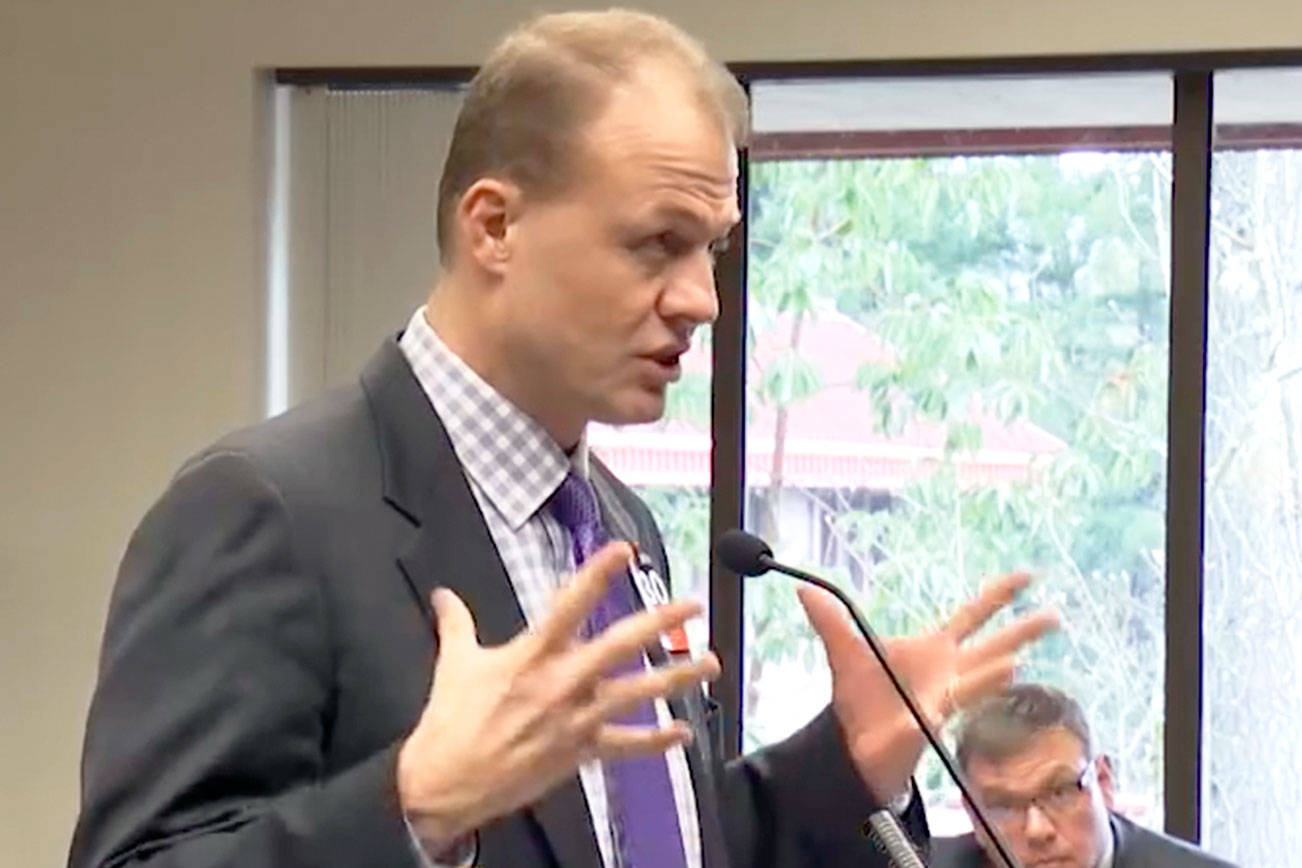OLYMPIA — When Attorney General Bob Ferguson sued anti-tax crusader Tim Eyman for multiple violations of campaign finance laws, he said he wanted to bar the initiative promoter from any financial role in political committees as a lasting punishment.
On Friday, Eyman tried to convince a judge such a penalty is illegal and should be immediately stricken because its existence is chilling his ability to raise money and participate in the political process.
He didn’t succeed.
Thurston County Superior Court Judge James Dixon denied Eyman’s request. It’s too soon, Dixon said. The issue won’t be ripe until the outcome of the case is known.
“It would be improper and it would be an error for this court to make a decision that what the state is seeking should not be allowed,” he said.
Eyman had urged the judge not to give in to the temptation to wait until later as state attorneys urged.
“Fear not, Mr. Eyman. There is no temptation,” he said. “It’s the law.”
Dixon’s ruling kneads another twist in the legal pretzel rising out of the allegedly illegal actions of the political activist in 2012.
Eyman, a former Mukilteo resident now living in Bellevue, is accused by the state of secretly moving money between two initiative campaigns and receiving kickbacks from a signature-gathering firm for one of the measures. Eyman denies wrongdoing.
Ferguson sued in 2017 on those charges. He’s since amended the lawsuit to encompass other alleged violations.
Among the punishments he seeks is to prevent Eyman from “managing, controlling, negotiating or directing financial transactions of any kind for any political committee in the future.”
Eyman, who represented himself in court Friday, argued that the language is vague and overly broad. If imposed, it would effectively end his involvement in political activity because pretty much anything he did could be construed as a violation.
“It’s the crux of the case. They want to prohibit me from participating in political committees,” he said. “It’s like saying, “He can be a truck driver as long as he doesn’t use a truck.”
Assistant Attorney General Eric Newman countered such a prohibition is legal and is being sought because Eyman is a serial offender of the state’s campaign finance laws.
The state wants to stop him from spending other people’s money and “secretly coming up with deals that would line his pockets,” he said.
Newman outlined a number of charges contained in the lawsuits. He accused Eyman of being a “shadow treasurer” for his initiative efforts in spite of a 2002 order barring him from serving as treasurer of any political committee. The state’s attorney also alleged Eyman laundered money through his wife and children to avoid disclosure laws.
“He’s been unapologetic. He’s still violating the law,” Newman said before concluding the whole discussion is premature and won’t be timely until the case is done.
Eyman has little time to ponder Friday’s setback as he and state attorneys will square off again next week in federal court.
On April 11, Eyman will ask U.S. Bankruptcy Court Judge Marc L. Barreca in Seattle to let him out of bankruptcy. And state attorneys will be there to oppose the request.
Eyman filed Chapter 11 bankruptcy in November to protect his personal assets while defending himself.
But now he contends the costs of the bankruptcy case are piling up. And with the campaign finance case months from trial and maybe years from resolution, he knows it will be a long time before he’ll able to settle his debts.
“After due consideration, and because the amount and nature of any claims that might be asserted are years out, the debtor wishes for his bankruptcy to be dismissed at this time,” Eyman’s attorney wrote in his initial filing. “The benefits of maintaining the expense of a Chapter 11 proceeding are outweighed by practical realities.”
State attorneys want Barreca to convert it into a Chapter 7 bankruptcy to allow the court to liquidate Eyman’s assets to satisfy creditors, and the state would be the largest. On March 1 it filed a claim for $2.36 million which represents fines sought in the 2017 case and a second campaign finance case.
Under Chapter 7, the court can rein in Eyman’s spending and prevent him from exhausting his assets, state attorneys wrote in filings with the court.
“The state is legitimately concerned about what might happen to Mr. Eyman’s assets following dismissal of the bankruptcy while his spending is not being monitored by the bankruptcy court,” they wrote. “The estate may soon be out of money if the bankruptcy is allowed to lapse, especially since Mr. Eyman does not have a regular job, nor a consistent source of income.”
Eyman spent almost $50,000 on personal expenses in the first two months of bankruptcy, state attorneys contend. He reported 39 restaurant purchases and bought movie tickets on 17 days in that period, according to the state filing.
Eyman counters in court papers that he is unable to “propose a feasible plan until the total amount owed to the state of Washington is determined and liquidated.”
And, in response to the state’s assertion he may fritter away his assets, he said he had $168,961.67 more in his bank account than when he filed for bankruptcy. That money came from friends, family and supporters of his political efforts.
“Four months ago, when I didn’t know how things were going to go, bankruptcy seemed the only option,” he wrote in a Wednesday filing.
But now, he wrote, “bankruptcy just doesn’t fit my circumstances anymore.”
Jerry Cornfield: 360-352-8623; jcornfield@herald net.com. Twitter: @dospueblos.








